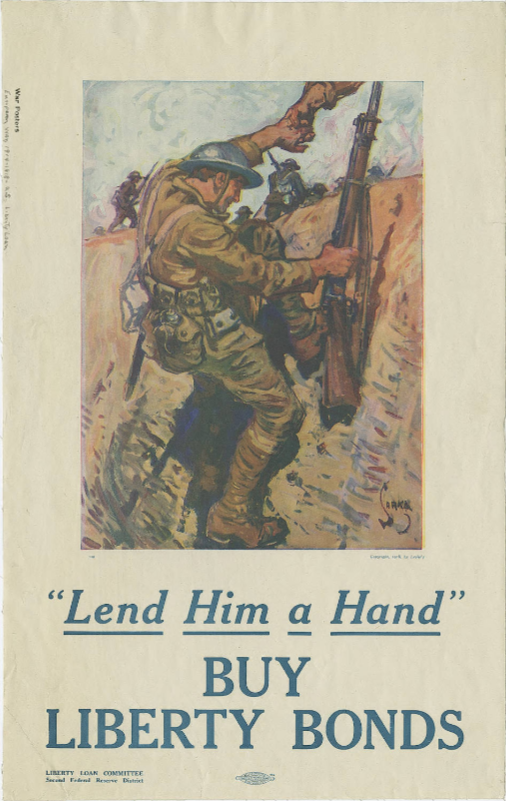
Upon her arrival at the U.S. Army basecamp, elegant entertainer Sarah Mildred Wilmer changed out of her travelling dress and into the brown wool jacket, breeches, and steel helmet of a doughboy. A talented performer and dramatic reader, she had arrived in Bar-le-Due, France, on September 4, 1918, on behalf of the Y.M.C.A. She was recruited to entertain the troops, but within twenty minutes of landing at the camp, she knew she would serve in a different capacity. She disguised herself as a soldier and headed to the front lines under heavy fire to help nurse the wounded. Wilmer would return from France to her parents in Hobart, Indiana, in a wheelchair and celebrated as a hero.[1]
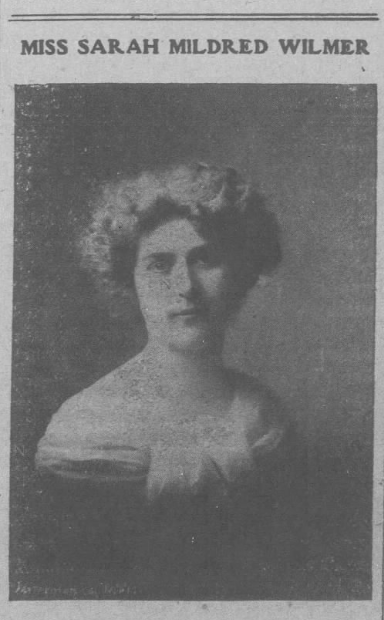
Sarah Wilmer was born to Benjamin and Ida Wilmer circa 1881 in Buffalo, New York. Her father worked as a printer for a daily newspaper and her parents made sure that she and her sister received an excellent education.[2] She “studied with the best” teachers and was “thoroughly schooled.”[3] Regarded as a beautiful young woman, Wilmer honed her elocution skills. As early as 1904, she began performing on the circuit of Chautauqua assemblies, traveling across the country and regularly stopping in the Midwest.[4] The Richmond Palladium, reported that she was “well-known by Richmond Chautauqua goers.”[5] A Wisconsin newspaper called her “one of the greatest artists on the platform today.”[6] The program for a 1909 Chautauqua at Shades Park near Waveland, Indiana, described her skill and artistry:
Miss Sarah Mildred Wilmer’s work is characterized by determination to present literary masterpieces of true dramatic value. She is not content to please by mere cleverness. There must be an honest effort to do her work artistically and well. This quality has always won warm approval wherever she has appeared . . . She presents a repertoire of exceptional strength, embracing many of the best selections from modern and classic fiction and drama. Certainly no reader of the platform has ever given more perfect and artistic presentation than those given by Miss Wilmer.[7]
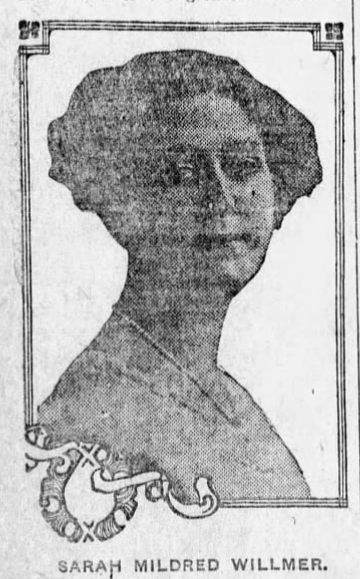
While her name may not be familiar today, she was famous, sought-after, and respected in her time. Drawing large crowds, Wilmer received top-billing and rave reviews. For example, in 1912, a Kansas newspaper called her “the greatest reader of the present generation” and reported that ten thousand people attended a recent Chautauqua to see her.[8]
She was also glamorous, dressing in fine clothes and staying in the best hotels. It would have been difficult for her adoring fans to imagine her dressed as a soldier, wading through mud, and dodging shells only a few years later.
Through her elocution work, Wilmer met Edward Van Bond of the Lyceum Bureau of Chicago and they were married in 1912. Unfortunately, her young husband died only a few years later, in 1915. She continued to keep a home base in Chicago near her parents who had moved to nearby Hobart, Indiana, and whom she visited often. She also continued touring and performing. After the U.S. entered WWI, however, she decided to use her talents to help the war effort.[9]
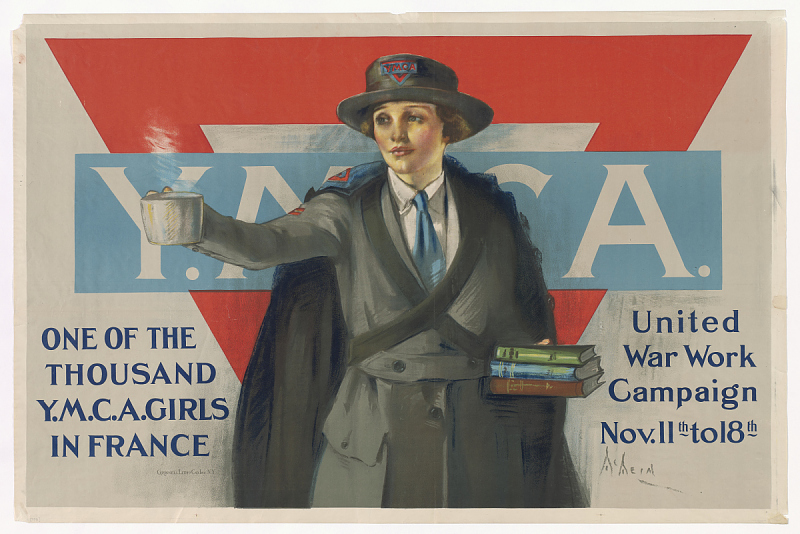
In 1918, the Y.M.C.A. asked Wilmer if she would be willing to go to France through a partnership with the American Expeditionary Forces to entertain the troops and raise their spirits. Not only did she cancel six months of Chautauqua appearances—a serious personal financial loss—she accepted the offer and refused payment from the Y.M.C.A. Lyceum Magazine reported:
Having had experience in surgical work she is well qualified to work in the hospitals and she plans on giving her programs in the hospitals during the day time and to the soldiers in the camps at night. She will give her regular play readings and also some special programs which she has prepared for the boys.[10]
It’s not clear when she would have gained “surgical work” experience, as newspapers show she was consistently busy with her Chautauqua performances. Whether or not she arrived in France with medical experience, she would soon be practicing on the battlefield.[11]
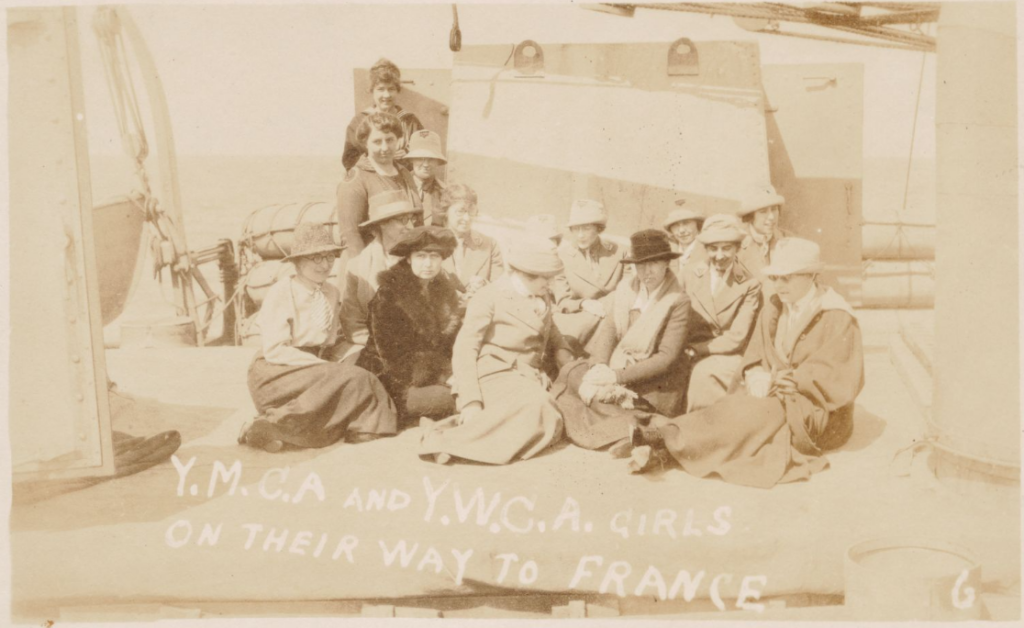
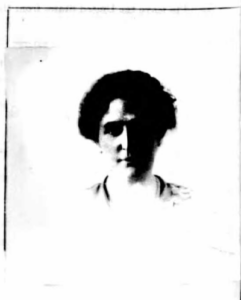
Wilmer left for France on August 4, 1918 and arrived September 4 at the Y.M.C.A base. Despite feeling scared, she was determined to be brave. In these later years of WWI, advancements in weapons technology meant that the hospitals and basecamps set up behind front lines were now in the line of fire for long range artillery and airplane bombings. She was right to be afraid.[12]
Wilmer gave different firsthand accounts of what happened next. A true performer, her story changed a bit as she polished and dramatized it for a public audience. Regardless, it is clear that she acted bravely and selflessly to aid the soldiers. She told the Chicago Tribune that upon arrival at the basecamp, the man in charge of the division’s entertainment greeted her and asked if she would “volunteer, then, to go to the front lines” to a camp where she would perform for the troops. He warned her that it would be dangerous, that she would “smell gunpowder and high explosives and gas.” She responded, “That is what I hoped for.” She entertained men during the day. However, at night she snuck to the front with the ambulance corps, intending to aid wounded soldiers. She explained:
Aided by friendly officers – entirely outside regulations and unknown to the “Y” man in charge of the base [entertainment] – I would dress in a soldier’s uniform and go up in total darkness.[13]
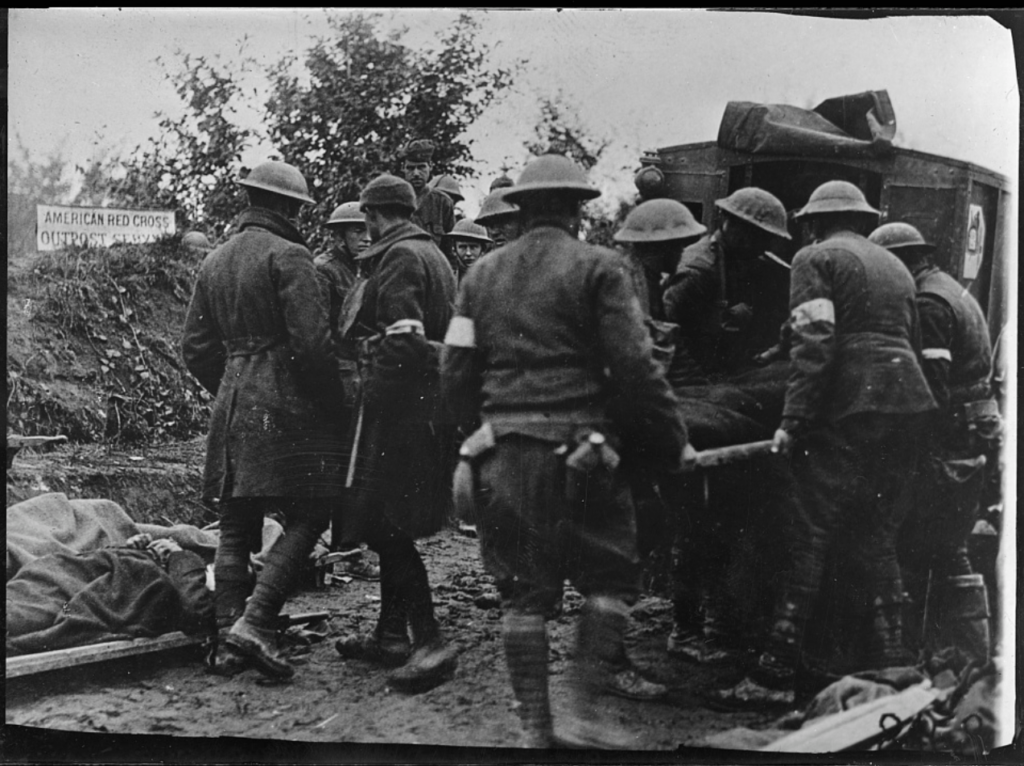
She also gave this description of a brush with death, mentioning the soldier’s uniform only as a passing detail:
I was in an ambulance, disguised as a man and dressed in a uniform, when we ran [the vehicle] into a shell hole, and promptly climbed out of it without stopping, with a driver grimly holding the wheel and never faltering for an instant, although shells were bursting all around us.[14]
A few days after she gave this account, she told the story to the Lake County Times with a few new dramatic flourishes, making the wearing of men’s clothing more central to the story:
How did I get to the front line? Well, I heard a young officer say, “Oh, it’s terrible up there tonight, a lot of the boys have been killed and wounded and there’s not nearly enough men to care for them.”
“Can’t you take me up there?” I asked him.
He told me I was a woman, that it would be breaking the rules.
“Well, get me some man’s clothes and I’ll be a man,” I replied. He hesitated and finally gave me a complete outfit, breeches, blouse, puttees [leg coverings], hobnails [boots] and all. And I went up.[15]
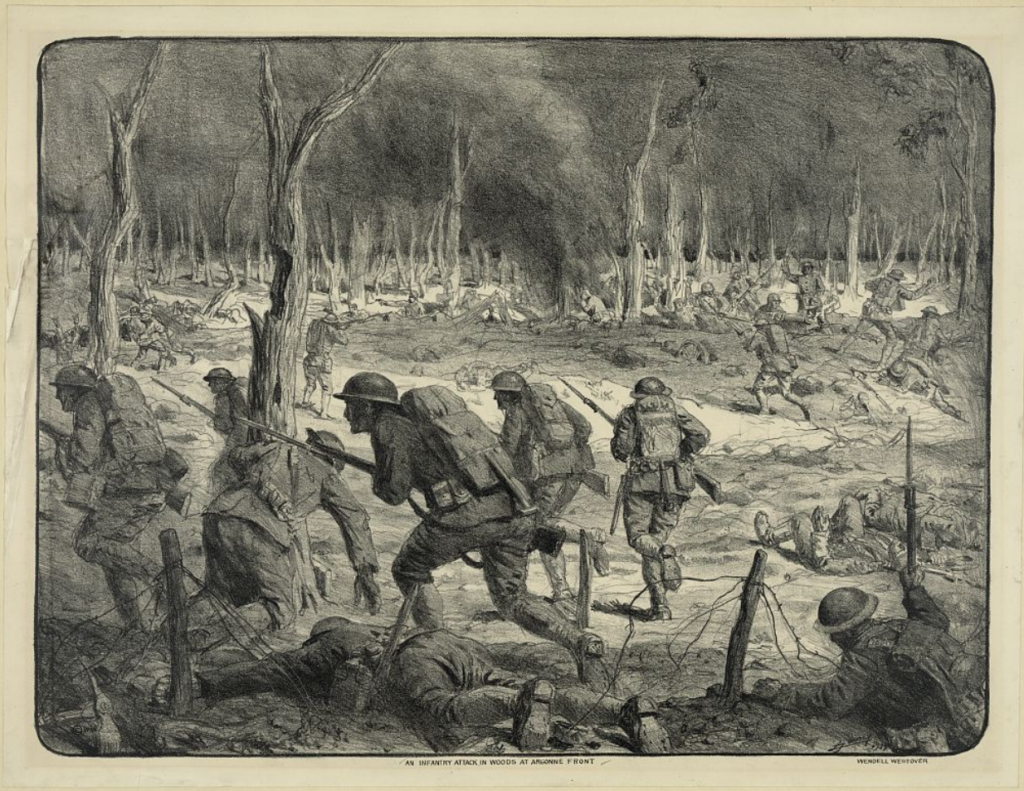
Wilmer explained that she went to the front nine times. And despite a bit of creative license with the details, she was consistent in her telling of the danger she faced and of the soldiers’ sacrifices. She recalled:
I was scared to death every time I went up to the line and would ask myself: “Why did I come here?” and then I would begin to sniffle and sob. But every time something would happen to show me why I had gone up there.[16]
But Wilmer knew why she had “gone up there” when she was able to help medical staff or comfort injured soldiers. One dark night in October, she had once again arrived at the front dressed in her doughboy uniform in order to provide help to the surgeons and nurses at the “first aid dressing station.” That night, the only breaks in the “uncanny” darkness were the “shells bursting” around them. Soldiers and medical staff carried their comrades into the medical station on stretchers. A doctor or nurse would then shine a flashlight on the injured to determine what care could be provided. The sight was often shocking. “O, it was horrible,” Wilmer said. She continued:
I was frightened, O, so frightened, but I did not dare to let that be known, for I was supposed to be a man. I helped with the boys who were brought in, and saw vividly the horror of it all, the lads dying and suffering, and had to remain quiet.[17]
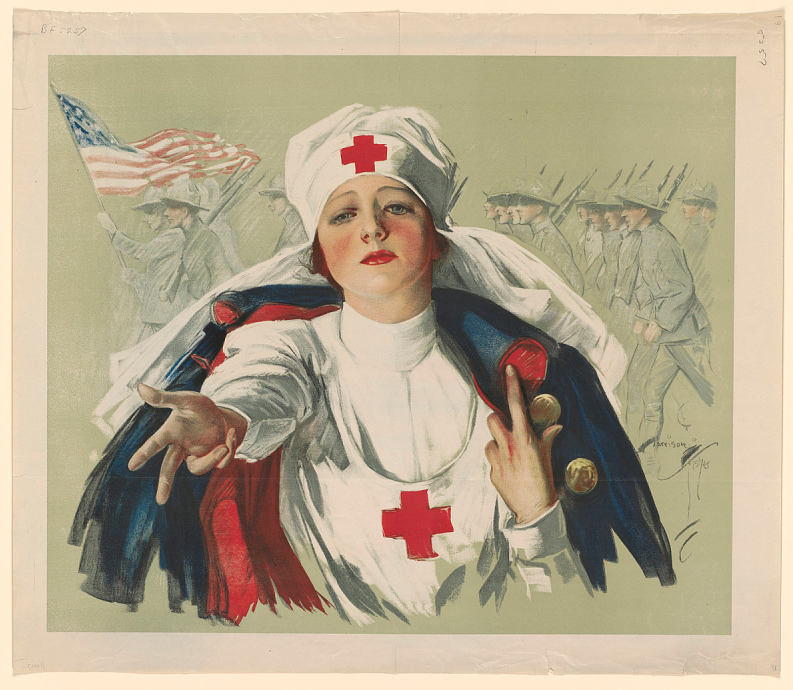
One incident in particular stuck with her. While she needed to dress as a man to help at the front, she was able to provide maternal comfort to a dying man. At one point, a soldier felt her hand and thought it belonged to a female Red Cross nurse. Wilmer denied her gender, telling him in “a gruff man’s voice” that there were no women at the front. But soon, when a man who was clearly dying, identified her as a woman, she conceded. This soldier had been shot in the lungs and was bleeding internally. Wilmer could only sit with him so he wouldn’t die alone. She smoothed his hair and he asked how it could be that a woman was at the front. Wanting to give him some of the comfort of home, she told him that his mother had sent her. He responded, “My mother? O, yes, I understand.” She then read to him from the Bible and he died in her arms.[18]
In late October, Wilmer was badly injured during a battle in the Argonne forest. Once again, she “went in front of the barrage, disguised as a doughboy.” She expounded:
I became sick suddenly. I smelled burning cabbage and bad onions and then I realized it was chlorine. Gas shells were breaking all around me . . . I grew faint and stumbled into a German dugout which had been deserted but a day previously. After five hours I recollected my thoughts and heard some voices. I walked out and found several stretcher bearers with whom I made the rear.[19]
While chlorine gas was not usually fatal, the effects could be long lasting or even permanent.[20] Wilmer suffered greatly as the gas “continued burning in her lungs” for weeks. But, she said, “I didn’t want to give up.”[21] Though she was back at base camp, she continued to entertain the soldiers with her dramatic readings. This was almost certainly uncomfortable in her condition. On November 11, 1918, she was reading to a large group of men when a colonel walked in and interrupted her to make an announcement. Germany had surrendered. The war was over.[22]
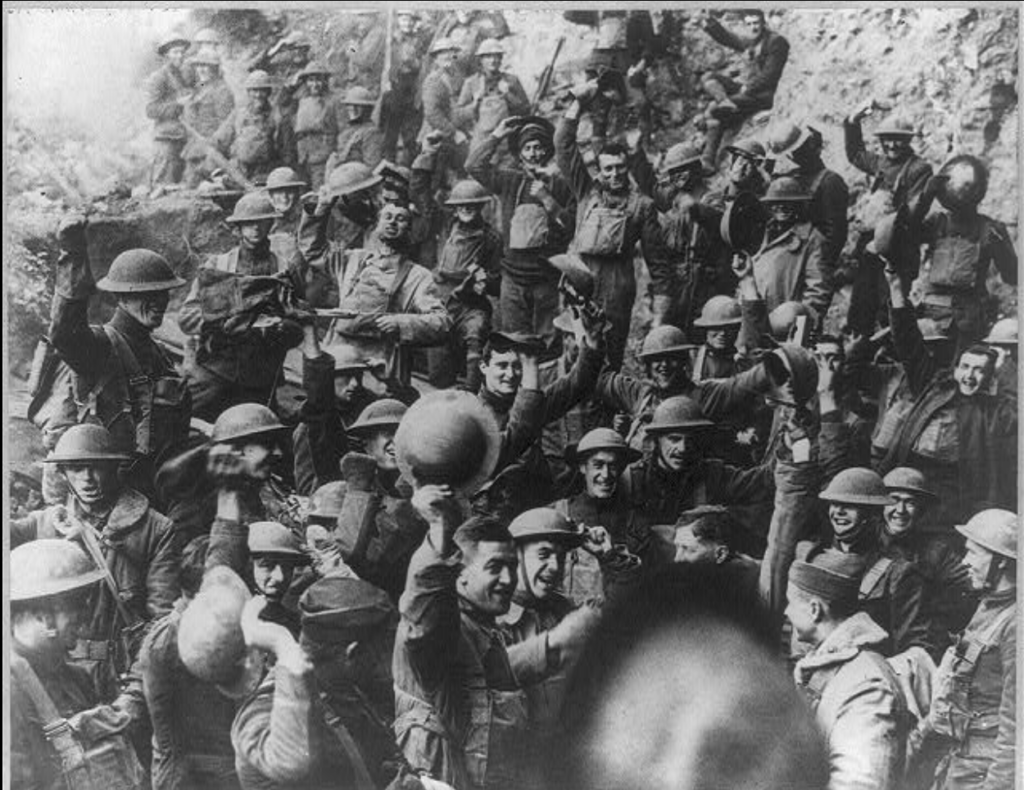
Wilmer soon sailed for the United States, still suffering from her injuries. By the time she reached New York, it became clear that she would need a nurse to continue her journey home to the Midwest and she hired a Mrs. Jane Redfield Vose to help care for her.[23] Wilmer and Vose went first to Chicago. Wilmer was there to visit Dr. Lena K. Sadler “with whom she had lived for years.” She was still suffering to the extent that she had to be carried from the taxi into the house by two men. Once inside, Sadler’s two young children ran to greet their adopted “Aunt Sarah.” Wilmer then needed “restoratives” to allow her to speak to reporters.[24]
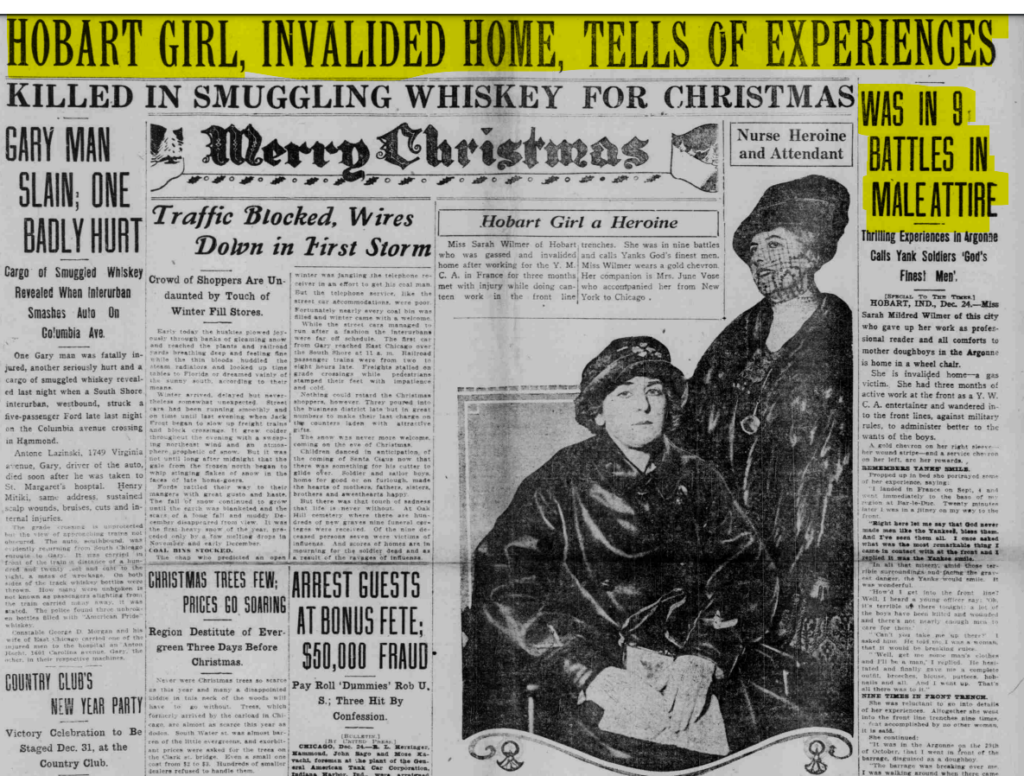
From Chicago, Wilmer went to her parents’ house in Hobart, which would be her home for some time as she recovered. She arrived in a wheelchair and was advised by doctors not to return to the stage for months. However, she travelled from the Region to Indianapolis as early as March 1919 to attend the “Big Meeting” where she delivered her speech “My Experiences in War.” And we can only imagine how much she had polished her tale during her months of recovery.[25]
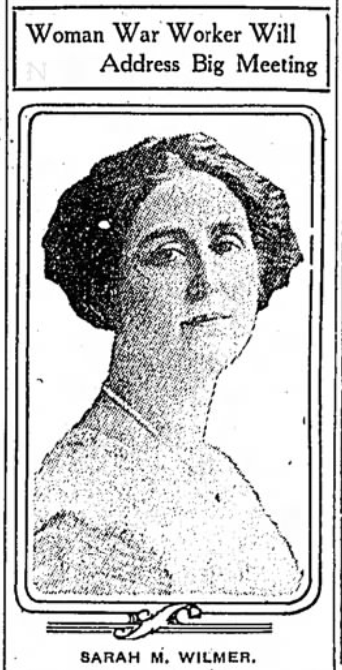
Though she returned to the stage, Wilmer wasn’t finished helping others. In 1928, she moved to Rochester, New York. A local newspaper reported:
Always interested in social service work, Mrs. Wilmer took up reading and soon took over classes in the Rochester schools, teaching lip reading and effective speech.
She also worked for the Rochester Board of Education and the League for the Hard of Hearing. When the U.S. entered World War II and women were again called to service, Wilmer answered. She worked a “line job on the graveyard shift” at the local General Motors factory, which had been converted to war production. She also continued her dramatic performances. She died in 1949, and was remembered in her obituary as a “heroine” who “brightened the lives of many” through her social work and dramatic arts. Though only briefly a Hoosier, she is one to remember.[26]
Notes
[1] “Hobart Girl, Invalided Home, Tells of Experience: Was in Battles in Male Attire,” Lake County Times, December 24, 1918, 1, accessed Hoosier State Chronicles.
[2] Tenth Census of the United States, Buffalo, Erie County, New York, June 7, 1880, District: 116, Ward: 2, Page: 17, Lines: 40-43, accessed AncestryLibrary.com.
[3] Pamphlet, First Annual Assembly of the Pleasant Shades Chautauqua to be Held at “The Shades” Near Waveland, Indiana, 1909, p. 8, Chautauqua Album, Indiana Album, accessed Indiana Memory.
[4] Advertisement, Oshkosh Northwestern (Wisconsin), September 19, 1904, 3, accessed Newspapers.com.
[5] “Chautauqua Performer, Well-Known Here, Returns from Y Work in France,” Richmond Palladium, December 18, 1918, 3, accessed Hoosier State Chronicles.
[6] “In Society,” Sheboygan Press (Wisconsin), February 12, 1913, 8, accessed Newspapers.com.
[7] Pamphlet, First Annual Assembly of the Pleasant Shades Chautauqua to be Held at “The Shades” Near Waveland, Indiana, 1909, Indiana Album, accessed Indiana Memory.
[8] “Would Have Ranked High as an Actress,” Caney News (Kansas), September 27, 1912, 2, accessed Newspapers.com.
[9] “Nephew of President Crossfield Is Dead,” Lexington Herald, August 11, 1915, 2, accessed Newspapers.com.
[10] “Miss Wilmer Goes to France,” Lyceum Magazine (July 1918): 31, accessed Google Books.
[11] Ibid.
[12] Sarah Joyce Wilmer, “War’s Glory and Horror as Seen by Chicago Girl,” Chicago Tribune, December 22, 1918, 4, accessed Newspapers.com; “Women in WWI,” National WWI Museum and Memorial, accessed https://www.theworldwar.org/learn/women. Note that the Chicago Tribune misprinted Wilmer’s middle name.
[13] “War’s Glory and Horror as Seen by Chicago Girl,” 4.
[14] Ibid.
[15] “Hobart Girl, Invalided Home, Tells of Experience,” Lake County Times, December 24, 1918, 1, accessed Hoosier State Chronicles.
[16] Ibid.
[17] “War’s Glory and Horror as Seen by Chicago Girl,” 4.
[18] Ibid.; “Hobart Girl, Invalided Home, Tells of Experience,” 1.
[19] “Hobart Girl, Invalided Home, Tells of Experience,” 1.
[20] “First Usage of Poison Gas,” National WWI Museum and Memorial, accessed https://www.theworldwar.org/learn/about-wwi/spotlight-first-usage-poison-gas.
[21] “War’s Glory and Horror as Seen by Chicago Girl,” 4.
[22] Ibid.; “Armistice,” National WWI Museum and Memorial, accessed https://www.theworldwar.org/learn/about-wwi/armistice.
[23] “Hobart Girl, Invalided Home, Tells of Experience,” 1.
[24]”War’s Glory and Horror as Seen by Chicago Girl,” 4.
[25] “Hobart Girl, Invalided Home, Tells of Experience,” 1; “Woman War Worker Will Address Big Meeting,” Indianapolis Star, March 16, 1919, 3, accessed Newspapers.com.
[26] “Sarah M. Willmer [sic] Dies; Heroine, Social Worker,” Democrat and Chronicle (Rochester, NY), July 14, 1949, 18, accessed Newspapers.com.
